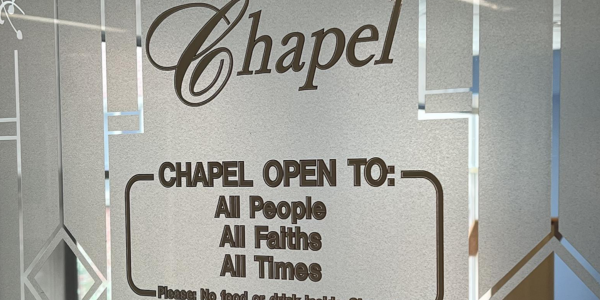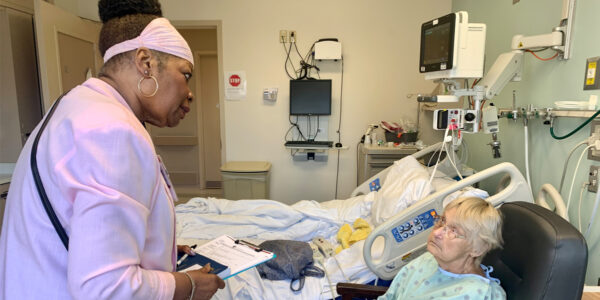Chaplaincy Services
At IU Health, we never forget that our patients are much more than simply a disease to be treated or an injury to be healed. We know each patient is a multifaceted person, with physical, emotional and spiritual needs.
That's why the people in the spiritual care and chaplaincy services department work closely with medical staff to assure the well-being of the whole person.
Concern for our patients and their loved ones is a long-standing tradition at IU Health. Our spiritual care department is one of the oldest in the country; its establishment dates back to 1937. Today, our purpose is to provide diverse ministries to enhance spiritual well-being, to educate for ministry and to be a prophetic voice for personal, communal and institutional wholeness.
About Our Services
Concern for our patients and their loved ones is a long-standing tradition at IU Health. Our spiritual care department is one of the oldest in the country; its establishment dates back to 1937. Today, our purpose is to provide diverse ministries to enhance spiritual well-being, to educate for ministry and to be a prophetic voice for personal, communal and institutional wholeness.
IU Health's chaplains are important members of the health care team who provide spiritual care to patients and their families, as well as to hospital staff. We offer care at the moment it is needed, with sensitivity to the many faith traditions of those we serve.
Our efforts to treat the whole person mean that the care we provide takes many forms, including the following:
- Spiritual care
- Connection to Faith Communities
- Grief support
- Listening
- Prayer
- Counseling
- Presence
- Worship
- Sacraments
- Spiritual guidance
- Clinical Pastoral Education (ACPE CPE)
- Guided imagery and visualization
- Meditation and relaxation techniques
Mission
IU Health's chaplains are important members of the health care team who provide spiritual care to patients and their families, as well as to hospital staff. We offer care at the moment it is needed, with sensitivity to the many faith traditions of those we serve.
Our efforts to treat the whole person mean that the care we provide takes many forms, including the following:
- Spiritual care
- Connection to Faith Communities
- Grief support
- Listening
- Prayer
- Counseling
- Presence
- Worship
- Sacraments
- Spiritual guidance
- Clinical Pastoral Education (ACPE CPE)
- Guided imagery and visualization
- Meditation and relaxation techniques
The Spiritual Care and Chaplaincy Services Department believes in the following values:
- Spiritual care is an essential dimension of health care.
- Through presence, word, sacrament and symbol, chaplains respectfully seek to meet people in their situations. They assess, nurture and support individual and communal spirituality, strengths and meaning.
- Through education and research in the health care setting, chaplains seek to understand and communicate the importance of spirituality and spiritual care. They seek to participate in the formation of persons as spiritual caregivers so that deeper health and wholeness might be experienced individually and communally. They promote interdisciplinary dialogue and cooperation, as well as holistic health.
Values
The Spiritual Care and Chaplaincy Services Department believes in the following values:
- Spiritual care is an essential dimension of health care.
- Through presence, word, sacrament and symbol, chaplains respectfully seek to meet people in their situations. They assess, nurture and support individual and communal spirituality, strengths and meaning.
- Through education and research in the health care setting, chaplains seek to understand and communicate the importance of spirituality and spiritual care. They seek to participate in the formation of persons as spiritual caregivers so that deeper health and wholeness might be experienced individually and communally. They promote interdisciplinary dialogue and cooperation, as well as holistic health.
- IU Health Ball Memorial Hospital: 765.747.3171
- IU Health Blackford: 765.348.0300
- IU Health Methodist Hospital: 317.962.8611
- IU Health University Hospital and Riley Hospital for Children: 317.944.7415
Contacting a Chaplain
- IU Health Ball Memorial Hospital: 765.747.3171
- IU Health Blackford: 765.348.0300
- IU Health Methodist Hospital: 317.962.8611
- IU Health University Hospital and Riley Hospital for Children: 317.944.7415
IU Health understands that good health includes body, mind and spirit and for many of our patients, a faith community is an integral part of the care team. We also know that social isolation and feelings of loneliness can have a negative impact on your health.
About the Congregational Care Network program
The IU Health Congregational Care Network connects patients to the right resources at the right time, providing faith-based encouragement along the way. IU Health chaplains have collaborated with congregations in your neighborhood to offer a listening ear and help make those connections.
We also know that social isolation and feelings of loneliness can have a negative impact on your health.
This program exists to address social isolation among participants that are:
- 50 years or older
- At least one hospitalization in the calendar year for a chronic condition
- Spiritual distress
- Isolated
If patient is interested in enrolling into the CCN program, the following applies:
- You may hear from an employed clergy to explain the CCN program to determine if you are interested.
- Patient completes and sign IU Health consent form (must have name, address, phone, signature and date).
The IU Health CCN program partners with congregational volunteers, called "connectors," who are each trained in spiritual and companionship care and are available to patients during their adjustment to life at home following a hospital stay. Connectors are available for persons of all faiths, and for persons who don't identify with any faith or tradition.
Connectors role
- Connectors offer one hour of conversation per week for twelve weeks.
- Connectors listen to your concerns and needs.
- Connectors help you connect to with your own inner strength and your own spiritual resources.
- Connectors help you to connect with community and health resources, such as assistance with social services or communication with your primary care office if a need arises.
Additional details
- This program is offered at no cost, and you can opt out of the program at any time.
- All conversations take place by phone or where possible by virtual platform, like Facetime or Zoom.
If you would like to learn more, contact us at CCN@iuhealth.org.

Congregational Care Network
IU Health understands that good health includes body, mind and spirit and for many of our patients, a faith community is an integral part of the care team. We also know that social isolation and feelings of loneliness can have a negative impact on your health.
About the Congregational Care Network program
The IU Health Congregational Care Network connects patients to the right resources at the right time, providing faith-based encouragement along the way. IU Health chaplains have collaborated with congregations in your neighborhood to offer a listening ear and help make those connections.
We also know that social isolation and feelings of loneliness can have a negative impact on your health.
This program exists to address social isolation among participants that are:
- 50 years or older
- At least one hospitalization in the calendar year for a chronic condition
- Spiritual distress
- Isolated
If patient is interested in enrolling into the CCN program, the following applies:
- You may hear from an employed clergy to explain the CCN program to determine if you are interested.
- Patient completes and sign IU Health consent form (must have name, address, phone, signature and date).
The IU Health CCN program partners with congregational volunteers, called "connectors," who are each trained in spiritual and companionship care and are available to patients during their adjustment to life at home following a hospital stay. Connectors are available for persons of all faiths, and for persons who don't identify with any faith or tradition.
Connectors role
- Connectors offer one hour of conversation per week for twelve weeks.
- Connectors listen to your concerns and needs.
- Connectors help you connect to with your own inner strength and your own spiritual resources.
- Connectors help you to connect with community and health resources, such as assistance with social services or communication with your primary care office if a need arises.
Additional details
- This program is offered at no cost, and you can opt out of the program at any time.
- All conversations take place by phone or where possible by virtual platform, like Facetime or Zoom.
If you would like to learn more, contact us at CCN@iuhealth.org.

Learn more about becoming a Board Certified Chaplain and explore opportunities available through these professional organizations.
Online Resources
Learn more about becoming a Board Certified Chaplain and explore opportunities available through these professional organizations.




